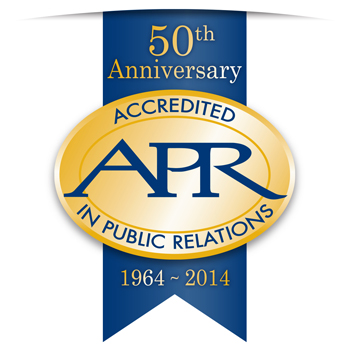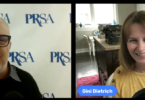APR White Paper and Timeline Now Available
It’s early morning during the last full week of March, and it’s snowing outside…in Virginia! It’s a gentle snow, and undoubtedly one of winter’s last gasps before the full emergence of spring. I know spring is right around the corner, because the crocuses are in bloom and the flowers always seem to know.
It’s a perfect time to reflect upon my career, where it’s taken me and how satisfied I’ve been with the journey.
It’s been more than 40 years since I started along my path, and I still love this work that I do. In that time the field of public relations has grown and flourished.
Yet in some ways, our field is still in its infancy. We struggle to emerge as a profession in the cla
ssic sense of the term. For example, there is no licensing authority. We are making progress, however. We have built a credible research basis for the field and we engage clients—be they internal or external clients—as professionals. We also have professional organizations, each with their own codes of ethics to guide our practice.
The field also has a recognized credential program. It’s called Accredited in Public Relations. The APR. And, it’s celebrating its 50th anniversary this year. And, April is APR month. As the snow falls and the seasons are about to change, it seems an appropriate time to reflect on the credential and look forward to the promise it provides.
I’ve never been able to figure out why the APR has had such a hard time gaining traction. I’ve heard some feel it doesn’t measure what they do in the office. I’ve heard it takes too much time. I’ve heard people would rather get a master’s degree. APR measures why you do what you do. It measures what you should know in order to do what you do well. It takes as much time as you want it to take, and it is not a master’s degree. It is a credential that must be maintained, not point-in-time learning, but continual refinement, sharpening and adjustment of knowledge, skills, and abilities.
I better understand those who wonder what’s in it for them. What does a Readiness Review accomplish? How does a Computer-based Examination apply to my work? Why is maintenance required?
Today, the Universal Accreditation Board shares with you a White Paper and historical timeline of APR. These documents present an honest self-look at the evolution, management and state of the APR today and answer the questions I pose above. They arrive at an important time as PRSA, a UAB participating organization, examines the credential in light of the OPG study. I encourage you to read this White Paper, the timeline and the OPG study. Think about these critical documents. And, act on them for the betterment of the field.
Mitchell Marovitz is president-elect of the National Capital Chapter and a member of the Universal Accreditation Board.








Thanks for sharing this, Mitchell. As a relatively young professional (eight years in PR), I still question the need for me to get my APR. During my undergrad years my professors and advisers (all ardent PRSA members) stressed the importance of APR. But after completing my M.B.A. and spending a number of years in corporate PR, I am hard-pressed to see what value APR brings to me. It seems only relevant in PR circles. And, truthfully, only relevant in PRSA circles. I know IABC has their own certification. I’m not sure PR will ever get to the point where a license is widely known and appreciated outside of our world. I welcome your thoughts!
Hi Adam, Thanks for sharing. I appreciate the question you raise. As I mention, you are not alone in asking it. As the white paper mentions, many who attain the APR are intrinsically motivated. They do it because it is there to do. Some want to demonstrate to themselves and others mastery of a proven PR process. Some want to more deeply understand the trust our clients, managers and the public place in us to do our work in an ethical manner, how to recognize ethical dilemmas before they become issues and how to react to them. Some do it because they are life-long learners. Today, few do it because it is a job requirement. I hope that changes. I hope senior leaders will someday see the value in hiring APRs for their middle management positions. They will be getting knowledgeable and skilled PR professionals who know how to lead ethically and produce for their organization. We’re not there yet, that’s for sure. One last comment, if you don’t mind. The APR is not and never has been a license. As we all know, anyone can call themselves a PR professional and work as one. The APR is a mark of distinction, certifying that the holder has demonstrated skills, knowledges and abilities recommended by the most recent and scientifically validated survey of the field.
Thanks for the reply (amazingly I just saw this). Good points here. Intrinsic motivation is one thing, but to your point, I think for the APR to really take off it has to be seen by others outside of PR as that mark of distinction.
Bravo on what’s being done to build awareness for the value of Accreditation in this 50th anniversary year. First, the disclosure: I served on the UAB from 2006 to 2011, and I’m APR Chair at PRSA Chicago. Really enjoyed reading the white paper and the timeline; one suggestion for the timeline: Around 2007 or thereabouts, the UAB produced the Online Study Guide and the Online Exam Demo and initiated the agreement with Oline2Learn for the Online Study Course. These resources remain very valuable for APR chairs, trainers and the candidates themselves.
Thanks, Edward, for your post and for the timeline additions. I’ll get them to the right folks on the UAB Marcom committee. Full disclosure from me: I’m a native Chicagoan! I gee up on the North Side and still love the Cubs and Da Bears!
[…] (Note: The original content can be found on PRSAY.) […]